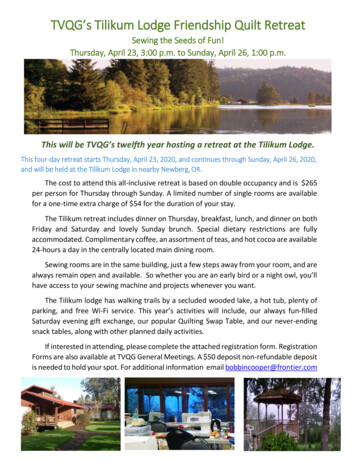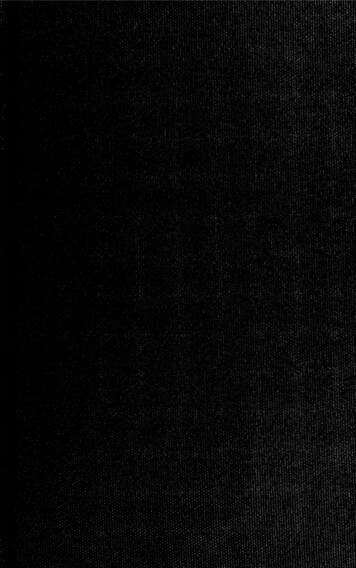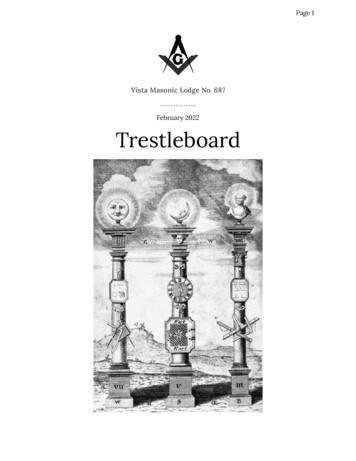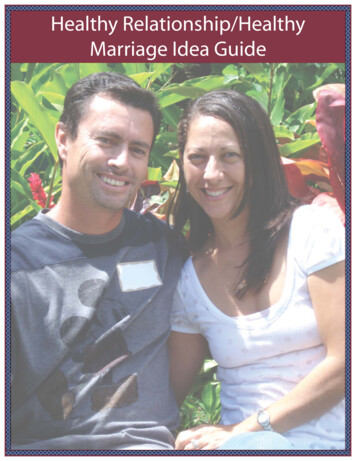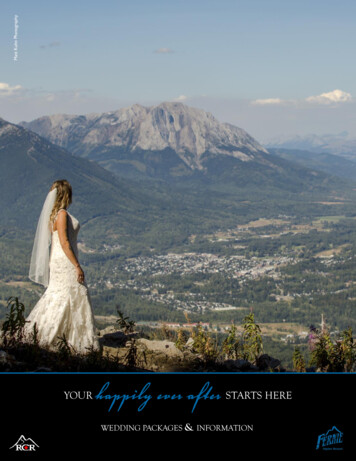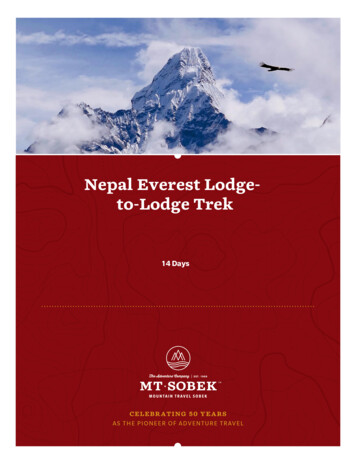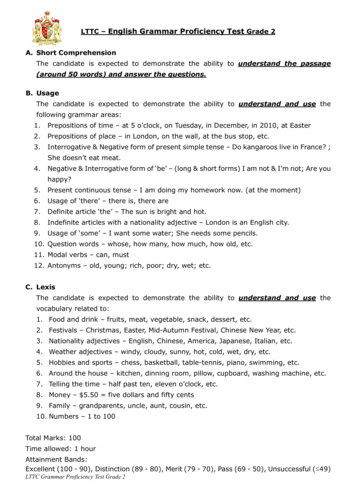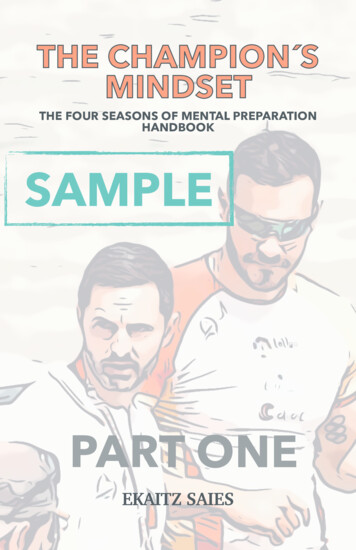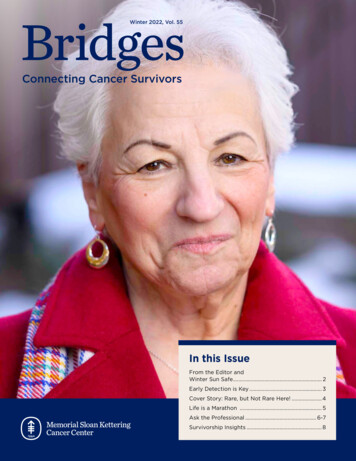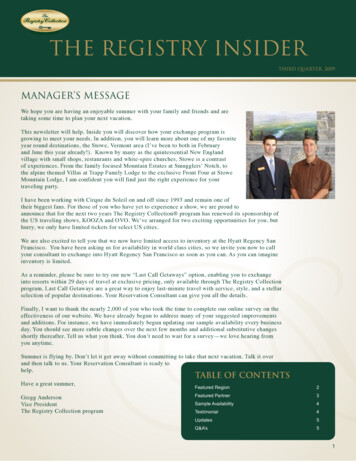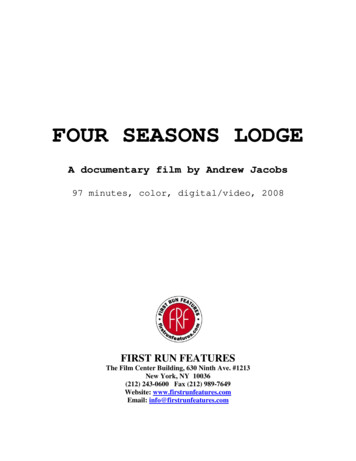
Transcription
FOUR SEASONS LODGEA documentary film by Andrew Jacobs97 minutes, color, digital/video, 2008FIRST RUN FEATURESThe Film Center Building, 630 Ninth Ave. #1213New York, NY 10036(212) 243-0600 Fax (212) 989-7649Website: www.firstrunfeatures.comEmail: info@firstrunfeatures.com
Brief SynopsisIn an inspiring and startlingly funny documentary, FOUR SEASONS LODGE follows a group ofHolocaust survivors during what might be their final summer together at a bungalow colony inthe Catskill mountains. Directed by New York Times journalist Andrew Jacobs, with beautifulcinematography by a team of filmmak ers including Albert Maysles, the verite film explores thepower of friendship and the drive to find joy despite painful memories. It is a counterintuitiveHolocaust documentary: a fusion of ribald humor, stories of unimaginable loss, the last of theBorscht Belt crooners, and a family made entirely of friends and lovers. The characters dance,flirt, and fight as the fate of their community hangs in the balance.Extended SynopsisFOUR SEASONS LODGE follows a group of Holocaust survivors, nearly all Polish Jews, who havespent 25 years summering together at an isolated rural compound in the Catskill Mountains ofNew York. They come for the raucous poker games, the dancing that goes on till dawn and thelong summer days spent with others who understand their pasts, and their unfathomable pain.The film focuses on a half-dozen characters over the course of a summer that might be their lastone together. Among them are Tobias and Lola, who met in a Nazi concentration camp but onlyrecently became lovers; Genya and Olga, two women whose 65-year-long friendship isalternately caustic, tender and revealing; Carl, the colony's president, who struggles to keep 100demanding residents content while tending his ailing wife; and Hymie, the vice president, who isthe colony poet, beloved jokester and a moody misanthrope who refuses to reveal his war-timepast.Midway through the summer, a rebellious knot of residents rises up to fight against the sale ofthe colony. Carl and Hymie, exhausted from the workload and dispirited by the death of so manyfriends, believe it is time to pack it in. Sides are drawn and the combatants dig in their heels.But the rebels say that as long as they are alive, the lodgers should enjoy life in what theydescribe as "our paradise in the mountains."During the film's second half, meetings are held, lawyers are hired and heated squabbles breakout. The outcome comes as a surprise, even to the lodgers themselves.Over the course of the summer, age-old rivalries are settled and cherished relationships comeapart. As the summer draws to a close, the lodgers throw one last party, the fate of their colonyundetermined but their spirits unbowed. Inevitably, sickness takes its toll. The film is a subtleexploration of aging and death, the power of memory and the ability of human beings tocelebrate life despite numbing loss.FOUR SEASONS LODGE is a counterintuitive film about the Holocaust: a verité, uplifting andinsightful portrait of people who embrace their dark pasts with striking openness and, at times,black humor.
FOUR SEASONS LODGEPrincipal CharactersHYMIE ABRAMOWITZ is the Lodge godfather, its unpaid handyman, resident misanthrope and anirreverent atheist who takes pleasuring in riling up the faithful. He is also a driving force behind thedecision to dissolve the colony -- and the only one who can save it. “They call this place paradise. It’snot a paradise for me. It’s a labor camp.”TOSHA ABRAMOWITZ is Hymie’s beleaguered wife and sidekick who, after 55 years of marriage,still finds his off-color jokes unbearable. She often provides a sobering counterpoint to Hymie, who useshumor to deflect questions about his agonizing past. “No matter how hard I try, he doesn’t want totalk about it.”ARON ADELMAN embodies the raucous spirit of the Lodge. He may be 91 and grievously ill, but Arondrinks scotch like water, stuffs his face with artery-clogging kielbasa and dances the mambo like a youngruffian. “The best thing in life is to eat, drink and be happy. When you’re finished, you’refinished!”BASIE ADELMAN is the bracingly frank wife of Aron and a Russian-born rebel who can dispense loveand disdain with a single glance. “He’s going to live like everyone else. Until he dies!”OLGA BOWMAN travels to the Catskills from her home in El Paso each summer to share a room withGenya Boyman, her life-long companion. Loving and insightful, Olga is the film’s unofficial narrator anda font of philosophical musings about life, aging and the value of friendship. “Life is not easy foreveryone. But life can be beautiful even when it’s not so easy.”EUGENIA “GENYA” BOYMAN, Olga’s companion, is an occasionally dour but eminently regalpresence at the Lodge. She is a straight-shooter who heaps ridicule on those who hide their age, but whenit comes to the past, Genya is incapable of talking about her wartime experiences.“One day, one day I’lltell my story – I suppose it will be on my deathbed.”TOBIAS BUCHMAN is a former soccer star who was the only Jew on the German team. After the deathof his wife, he falls in love with Lola, a fellow lodger whom he first met at a Nazi death camp.Unexpected illness, however, tests the bonds of their blossoming affair. “To be in love at my age issomething I never expected. Somebody must be watching over us.”CARL POTOK is the president of the lodge and a selfless workhorse who struggles to keep the colonygoing even as he tends to his ailing wife, Cesia. He is also a pragmatist who has no use for religion. “Iwas in concentration camp four years and I never saw no miracles. Luck yes. As far as I’mconcerned God is about miracles.”CESIA POTOK, Carl’s wife, is battling Alzheimer’s disease and confined to a wheelchair. Her hauntingcries, which reverberate across the colony, are an unwelcome reminder of mortality. “We were togetherin one camp. When we were liberated she didn’t have nobody and I didn’t have nobody. Fourmonths later we got married.”LOLA WENGLIN is the spunky paramour of Tobias Buchman who reluctantly agrees to leave thecolony early after he gets sick. “I’ll run away, find another boyfriend and come back to thecountry.”
DIRECTOR’S STATEMENTIs there joy after horror?Can people who have survived unfathomable trauma find contentment?In 2005, I stumbled upon a group of Holocaust survivors who share a rural compound in upstate NewYork. I was astounded by what I found. I expected the elderly residents of Four Seasons Lodge to be sad,broken and embittered. Instead I discovered a vibrant band of men and women who laughed like children,traded salty barbs over mahjong games and danced late into the night.Of course there was plenty of sadness amid the revelry. Even when doubled over in laughter, the Lodgerswere shadowed by harrowing memory: the pain of losing entire families to the gas chambers, thedegradation of the Nazi death camps and the numbness that set in after liberation, when the Lodgers, thenteenagers, realized they were orphaned and homeless.That summer, I wrote an article about the lodge for the New York Times but when I found out the placewas going to shut down and that the following summer would be the last, I decided I had to do somethingmore. Although I had never made a film before, I realized only a documentary could accurately conveythe essence of these remarkable people.With the help of Albert Maysles and a team of seasoned cinematographers, we spent the next summerfilming among the lodgers, whose warmth and openness were humbling. We ended up with more than250 hours of footage but more importantly, we came away with valuable lessons: we discovered thatpeople, regardless of age and despite having endured unspeakable atrocity, can experience happiness andjoy. And, amazed, we watched people in their 80s and 90s flirt, find new romance and resolve 40-year-oldrivalries.“Four Seasons Lodge” tells a story that has never before been told. It is the story of Holocaust survivorswho refuse to be victims, who chase after life with intoxicating zeal, and who have learned that there is nodifference between friendship and family. In the end, the film is also a last glimpse of a vanishing worldand an inspiring testament to the men and women who survived Hitler’s murderous Final Solution.As we have screened the film in recent months before audiences young and old, Jewish and Gentile, theresponse has been astounding. “Four Seasons Lodge,” we have been told, is a important film that shouldbe seen by people all over the world: it is heart-rending, uplifting and startlingly funny; but most of all, itis a film that offers indelible lessons about the challenges of aging, the comfort of old friends, the powerof memory and the importance of embracing joy even in the face of mortality.
FOUR SEASONS LODGE Production TeamDirector . Andrew JacobsProducers . Matt Lavine, Andrew JacobsCoproducers . Roger Bennett, Rhoda Herrick, Elyssa HessEditors.Kim Connell, Aaron SoffinMusic .Eric LewisCinematography. Albert Maysles, Andrew Federman, Avi Kastoriano, Justin ScheinExecutive Producer .Kelly SheehanAndrew JacobsAndrew Jacobs has been a staff writer at the New York Times for the past ten years, where he hascovered a wide variety of beats, from the American South and the aftermath of Sept. 11, to New Jerseypolitics and the New York City Police Department. The idea for "Four Seasons" grew out of a six-partseries Jacobs did for the Times about summer life in the Catskills. A graduate of New York University,Mr. Jacobs spent a year teaching and writing in China during the pro-democracy movement.Albert MayslesAlbert Maysles is a pioneer of Direct Cinema who, along with his brother David, was the first to makenonfiction feature films (Grey Gardens, Salesman, Gimme Shelter) where the drama of life unfoldswithout scripts, sets, interviews or narration. With his first film, Psychiatry In Russia (1955) he made thetransition from psychologist to documentary filmmaker. In 1960 he co-created Primary. His 36 filmsinclude What's Happening: The Beatles in the USA (1964), five films of the projects of Christo andJeanne-Claude (1972 to 1995), and three documentaries for HBO. He received a Guggenheim Fellowship(1965), a Peabody, an Emmy, five Lifetime Achievement Awards, the award for best cinematography atSundance (2002) for Lalee's Kin, which was also nominated in 2001 for an Academy Award and mostrecently, the Columbia Dupont Award (2004). In 1999 Eastman Kodak saluted him as one of the 100world's finest cinematographers. Albert's latest project, The Gates (1979-2005), is currently inpostproduction.Matt LavineMatt Lavine was the co-producer, creative consultant and outreach coordinator of the critically-praisedTying The Knot (2004), winner of 11 festival awards, including best documentary at the FramelineInternational Film Festival. The film had a national theatrical release by Roadside Attractions, played inover 70 cities, 110 festivals, and 21 countries. Tying was aired nationally on television, and is now widelyavailable on DVD. Previously, Matt was the Director of Education at Film/Video Arts, part of ten years’experience in non-profit media arts education. He’s also been a field producer and an associate produceron reality and lifestyle series for the Fox network and Fine Living network. Additionally, he has producedand edited a number of short docu-videos, including pieces on deaf education.
Kim ConnellKim Connell is the Founder and President of Rainlake Productions. Over the past 15 years she hasdirected, produced and edited award-winning television programs, feature documentaries as well aseducational, corporate and non-profit videos. She recently completed Follow My Voice With the Music ofHedwig a documentary that premiered at the Tribeca Film Festival and that aired on the SundanceChannel in June 2006. She is also the Executive Producer and Supervising Editor on the Rainlake filmCrossing Arizona, which was featured in the 2006 Sundance Film Festival in the Documentarycompetition and has won numerous awards this year. Most recently, Kim was a Senior Editor atShowtime and the Senior Editor on Religion and Pop Culture a one-hour special for VH1. She edited andco-produced TLC's "Black Las Vegas: In Through the Backdoor" (2004 Silver World Medal) and aDiscovery Health premiere, "Medical Profile: Christopher Reeve." Kim was also Senior Editor on theaward-winning documentary feature film "The Making and Meaning of We Are Family," a filmpromoting tolerance and cultural understanding in the wake of the September 11th attacks. "We AreFamily" was honored at the 2002 Sundance Film Festival and aired on Trio.Aaron SoffinAaron has been working as a long form documentary editor since graduating Yale in 2004. He cut twofilms about the war in Iraq, The Blood of My Brother and When Adnan Comes Home. These films playedaround the world including festivals in Iran, Dubai, Pakistan, and The Netherlands. When Adnan ComesHome recently won Best Documentary at the 2007 Vail Film Festival. The Blood of My Brother playedtheatrically in US theaters in 2006 and is now widely available on DVD.
DIRECTOR’S BIOGRAPHYAndrew Jacobs, the director of Four Seasons Lodge, is a staff reporter at the New York Times. Inhis ten years at the paper, Jacobs has covered a wide range of beats and topics, including the New YorkCity Police Department, Manhattan Criminal Courts, the aftermath of the terrorist attacks on the WorldTrade Center, and, based in the Times’ Atlanta bureau, the American South, where he covered news,politics and cultural trends in eight states. Jacobs also originated a beat for the Metro section, “New Yorkat night,” in which he wrote about the culture and the characters who populate the city after dark.In 2002, he wrote an award-winning investigative series on a real-estate scam in the Poconos thatdestroyed the finances of hundreds of working-class New Yorkers who were lured to Pennsylvania bypromises of affordable housing that turned out to be over-valued and poorly built. In 2001, Jacobs waspart of a team of reporters who won a Pulitzer Prize for the Times’ 9/11 coverage.Before he was hired as a full-time staffer, Jacobs spent three years working as a contract writerfor the paper’s City section, where he was hired to write two dozen cover stories about the eccentricitiesof New York life and the unique characters that make the city so compelling; its rogue cops, privilegedprep school kids, homeless can collectors, Pakistani cab drivers and East Village squatters.Jacobs’ journalism career began in 1989, when he was living in China during that country’s prodemocracy movement. Then an English teacher at Hubei University, he began writing about the studentprotests and the government crackdown, contributing articles to Newsday, the Village Voice and theAssociated Press. After returning to the United States, Jacobs continued writing for a collection of NewYork City publications and later served as the editor of Manhattan Spirit and its sister publication, OurTown. In 1991, he helped found a short-lived gay newsweekly magazine, QW, and was its news editoruntil the publication folded a year later.Through the years, he has also held a number of other jobs unrelated to journalism: as a presssecretary to City Councilman Tom Duane, as an architectural historian who led walking tours for theMunicipal Art Society, as an English teacher and an architectural historian for the city’s LandmarksPreservation Commission.Although Four Seasons Lodge is his directorial debut, Jacobs has been a lifelong videographer, acompulsion that began as a high school student in the early 1980s when his parents purchased one ofSony’s earliest home video camera clunkers. Andrew was born in Newark, New Jersey, and attendedNew York University, where he studied architecture and urban design.Jacobs’ love affair with the Catskills began with family vacations at the Concord Hotel; and morerecently has included the purchase of an abandoned dairy farm in Ulster County that he is currentlyrenovating.
FOUR SEASONS LODGE –SELECTED PRESSCRITIC’s PICK! "Like a funny visit with your grandparents, multiplied by a dozen." - New York Magazine“Surprising affirmative and joyous.remarkable unexpectedly warm and affirmative film.”-Kenneth Turan, The LA Times“Gorgeously photographed. What is heroic [about] these rowdy, cantankerous survivors is their unquenchableappetite for the pleasures of the everyday.the awesome spectacle of life triumphing over annihilation.”-Ella Taylor, The New York Times“Life affirming and touching pitch-perfect film provides an affectionate look at a brave, disappearing subcultureLou Lumenick, NY Post4/4 Stars! “spectacular cinéma vérité documentary the feel of such classic Maysles brothers’ works asSALESMAN and GREY GARDENS an extraordinary accomplishment, a subtle yet unforgettable experience thatis one of the best films of the decade.” –This Week in New York“Surprisingly upbeat docu debut ultimately rewarding.” –Ronny Schieb, Variety“A full-bore cinematic feast.” - Michael Atkinson, Boston Phoenix“Film poetry akin to Michael Apted's ongoing Up series an image-rich mosaic of group psychology thatsurprisingly illuminates the ineffable.” -Joseph Jon Lanthier, Slant Magazine"Captures the simultaneously timeless and fleeting quality of a memorable summer, juxtaposing a well-pacednarrative and a compelling, unscripted storyline with tender, intimate moments in the subjects' lives."-Sol Israel, The Boston Globe“Warm and gushy you’ll likely leave the film with a smile on your face and a tear or two of happiness in youreyes.” –Ed Symkus, The Patriot Ledger“The funniest Holocaust-themed doc yet made warmly entertaining, beautiful.”--Time Out New York“Surprising lets moments of peace, sadness, and consternation play out gracefully.”–Michelle Orange, The Village Voice“Neil Simon should only write such dialogue!.these survivors are feisty, lively and spoiling for a fight.”–George Robinson, The Jewish Week“Jacobs has done the unlikely: He’s put together and filmed a lovable ensemble of charismatic, lox-loving, lifeloving Holocaust survivors.” –Heeb MagazineA lively and affectionate as much a historical document as entertainment.”-Matt Connolly, The Times Herald-Record“Moving and uplifting.” –Martha Mendelsohn, The Jewish Week“One of the most moving documentaries I have seen this year and give it my strongest recommendation.”-LouisProyect, The Unrepentant Marxist“A fascinating portrayal of human survival and community.” –Tribeca Film Blog“At once humorous, melancholy, uplifting and poignant.” –Times Herald-Record"Lands in a class of its own." - IndieWIRE
“Uplifting.” –Jewish Journal“There's more laughter than sorrow in Andrew Jacobs's inspiring documentary about people who would rather lookforward than backward.” “-Rick Warner, Bloomberg.com“Tickling funny bones: this community of elderly Catskill visitors never drown in misery, but instead live out theirdays with fervor.”-Matthew Nestel, Boxoffice Magazine"Packs more wisdom than the best therapy session." - Christian Toto, Washington Times“Must-see.” – Newsday“Charming, bittersweet.” –This Week in New York"A bittersweet, life-affirming documentary." - Jewish News Weekly"A heartwarming, poignant, and surprisingly funny film." - East Hampton Press"Make a point of seeing this film, it is a remarkable one!" - The Independent (East Hampton)“Exquisite!” - Documentary.org, International Documentary Association"The power of friendship and the drive to find joy despite painful memories is explored in the emotional film." Westchester Journal NewsFOUR STARS! –Kam Williams, Newsblaze“A quietly revealing tribute.”–Nora Lee Mandel, Film Forward
MOVIE REVIEWFour Seasons Lodge (2008)Hymie and Tosha Abramowitz in “Four Seasons Lodge,” directed by Andrew Jacobs.In the Catskills, Holocaust Survivors Forge aBondBy ELLA TAYLORPublished: November 11, 2009The exuberant Jewish retirees gathering for their 26th summer at a modest Catskills bungalow colony inAndrew Jacobs’s documentary “Four Seasons Lodge” appear like any group of older Americans onvacation. They socialize, eat, argue, sing and dance, chortle at the risqué gags of cabaret entertainers, trytheir best to maintain the colony’s aging physical plant, care for ailing spouses and — like most people intheir ’80s and ’90s — look death in the face on a daily basis.The difference is that, at an age when most Americans were sowing oats or planning futures, just abouteveryone in “Four Seasons Lodge” had left the wreckage of Nazi-occupied Poland and arrived in theUnited States an orphan without kin.In contrast with most survivor documentaries, this film has little formal testimony. These men andwomen, some of whom have regrouped into new couples after the death of their partners, vacation
together not to mull over the past but because their suffering is a base line they hold in common and seelittle reason to announce — at least until a filmmaker comes to call. When Mr. Jacobs prods them formemories or theories about why they survived when others succumbed, some cooperate eagerly, whileothers balk or change the subject.“Four Seasons Lodge” grew out of a series of articles by Mr. Jacobs, a reporter for The New York Timesand a novice director who was imaginative enough to enlist the help of the eminent véritécinematographer Albert Maysles (“Grey Gardens”). The lyrically complicating hand of Mr. Maysles, whoshot the film with several collaborators, is everywhere apparent in the way the camera picks a path aroundcoherence, refusing narrative in favor of the thick detail of life unfolding: a small sea of umbrellas drips ona patio; several old women hobble from the clubhouse with plastic bags protecting their heads from anunexpected rain shower.All the more shocking then is the almost casual revelation by the colony’s vice president that he wasoperated on by Josef Mengele, or the recollection by another resident of the exact time of day theGermans entered Lodz and hanged a Jew in public as a warning to the rest.If Mr. Jacobs holds out modest hope for the temporary survival of this rapidly dwindling community, henimbly avoids an inspirational ending, a pipe dream for those who have seen the worst that man can do.Call these sometimes rowdy, cantankerous survivors heroes if you like (some are more serene than othersabout death intruding for a second time); they certainly don’t. Several believe they survived through God’shelp or because they were poor and knew better than the rich how to endure; others are convinced thatdumb luck saved them. What is heroic is their unquenchable appetite for the banal pleasures of theeveryday.As the gorgeously photographed seasons pass over this tranquil place, they signal the endless cycle ofdecay and renewal, indifferent to human aspiration. What can Holocaust survival possibly mean but theawesome spectacle of life triumphing over annihilation by stubbornly reasserting itself, over and overagain?
dge11-2009dec11,0,86337.storyDecember 11, 2009MOVIE REVIEW'Four Seasons Lodge'A documentary about Holocaust survivors who gather at a summer retreat in the Catskill Mountains every year issurprising affirmative and joyous.By Kenneth Turan, Film CriticHow does life go on, where does it go, when a person has had to confront the worst existence has to offer?Inspirational in unexpected ways, "Four Seasons Lodge" provides answers to those eternal questions, bringing avibrant perspective to the familiar lines about the resilience of the human spirit.Four Seasons Lodge is the name of a bungalow colony in New York's Catskill Mountains, a summer retreat forHolocaust survivors, people now in their 80s who were liberated from concentration camps as teenagers. "Wesurvivors, we stick together like glue," one woman says. "We want to be together; we need it." Adds another, "Wecreated a family from our friends."This was a necessary act, because many of these individuals found at the end of World War II that they alone of theirfamilies had made it out alive. One man estimates he lost 300 relatives: "I was the only one left." A womanremembers, "We are free, but where do we go, what do we do?"One thing they often did was marry each other ("Hitler was the matchmaker" is the sardonic way the phenomenon isdescribed). In 1980, some two dozen families purchased the Four Seasons Lodge, but now, with the men who keptthe place running dealing with personal problems and failing health, the group is facing "our last season in paradise,"acknowledging that the summer of 2006 might be the final one.Documentarian Andrew Jacobs, the director of "Four Seasons Lodge," is a journalist for the New York Times, not afilmmaker, but when he came across the lodge as part of a series he wrote, he clearly understood that these people,their experiences and their world needed to be documented before they disappeared.Though this may sound like a sad story, it is, in fact, a joyous one. These people came out of their experience with anintense desire to enjoy life as much as possible. Not in a heedless, thoughtless way, but with a deep sense of howprecious, how fragile, each moment was. As 91-year-old Aron, seen dancing in the film's opening sequences, puts it,"You try and do the best you can for as long as you can."When these people say, "You live until you die," you know they mean every word.Part of the pleasure of "Four Seasons Lodge" is meeting these indelible individuals, people who say irascible thingslike, "It was the poor kids who made it in the camps; German Jews didn't survive one hour." We meet a couple whogot together when their spouses died, a man who worked on Hitler's cars, another who survived Mengele's sadisticexperiments, and people who still can't talk about what they experienced, what they saw.Perhaps the most remarkable thing this unexpectedly warm and affirmative film shows us about the survivors is that,far from blocking out their past, they've managed to enjoy these unexpected years despite continually living with theirpersonal horrors."This is always behind your head, bad memories; no psychiatrist in the world can heal you from that," one man says.Still, as they all insist, "tomorrow is another day," and for people who never expected to experience so manytomorrows, that is a blessing indeed.kenneth.turan@latimes.com
Home » Articles » Film » Films Features » A Couple of Many SeasonsWednesday, November 11,2009A Couple of Many SeasonsIn 'Four Seasons Lodge,' Andrew Jacobs details the lives of a group of Holocaust survivors who facetheir final summer togetherBy Susan ReiterWhen Andrew Jacobs spent several late-summer days at FourSeasons Lodge, a close-knit Catskills bungalow colony, in 2005, he was there to write a feature article for the New York Times. Buthis experiences amid the longstanding community of aging but spirited Holocaust survivors affected him well beyond completing thearticle. Rapidly and efficiently, the Times staffer morphed into a documentary filmmaker. He felt compelled to capture the uniqueatmosphere and vivid personalities of the place particularly when he learned that the colony had been sold to a developer, and thatthe summer of 2006 was scheduled to be its last.His film, Four Seasons Lodge, is a portrait of the daily and weekly rhythms of the place, and of these 80-somethings most of themPolish Jews who not only survived unimaginable horrors in their youth, but went on to live long, rich lives. Shadowed by theirineradicable personal Holocaust histories, they nonetheless confront life with gusto, and through their shared experiences, form aclose-knot community at this colony."I think that was the thing that drew me to them was this incredible dichotomy this contrast between giddy, joyous, fun-lovingatmosphere part of the time, and then at other times you couldn't escape how grim and heavy and dark they are," Jacobs said,during a recent phone interview. Now a Beijing correspondent for the Times, he had just flown in for the film's opening this week atthe IFC Center—its first theatrical run following numerous presentations at film festivals. Some of the residents, many of whosearms bear the ever-present reminder of ID numbers from Auschwitz and other camps, are forthcoming with narratives of whathappened to them and their families under Hitler. For others, the memories are too painful to discuss.Jacobs' four cinematographers were led by the venerable Albert Maysles, who came on board eagerly. They shot a total of 250hours, following the colony's rhythms from the rainy early-June arrival day as old bonds are renewed, to the bittersweet farewells asautumn arrives. Saturday-evening celebrations, with everyone dressed to the nines, alternate with quiet, introspective conversations
around the unpretentious but pleasant surroundings. Jacobs shuttled back and forth, using his vacation time and weekends whilecontinuing with his "day job" at the Times.Among the film featured personalities are Carl Potok, the colony's indomitable president, and Hymie Abramowitz, his orneryassistant and the place's Mr. Fix-it. Despite their advanced years, they are determined to perform all necessary chores and repairsthemselves. The dynamics of thei
“Four Seasons Lodge,” we have been told, is a important film that should be seen by people all over the world: it is heart-rending, uplifting and startlingly funny; but most of all, it is a film that offers indelible lessons about the c
